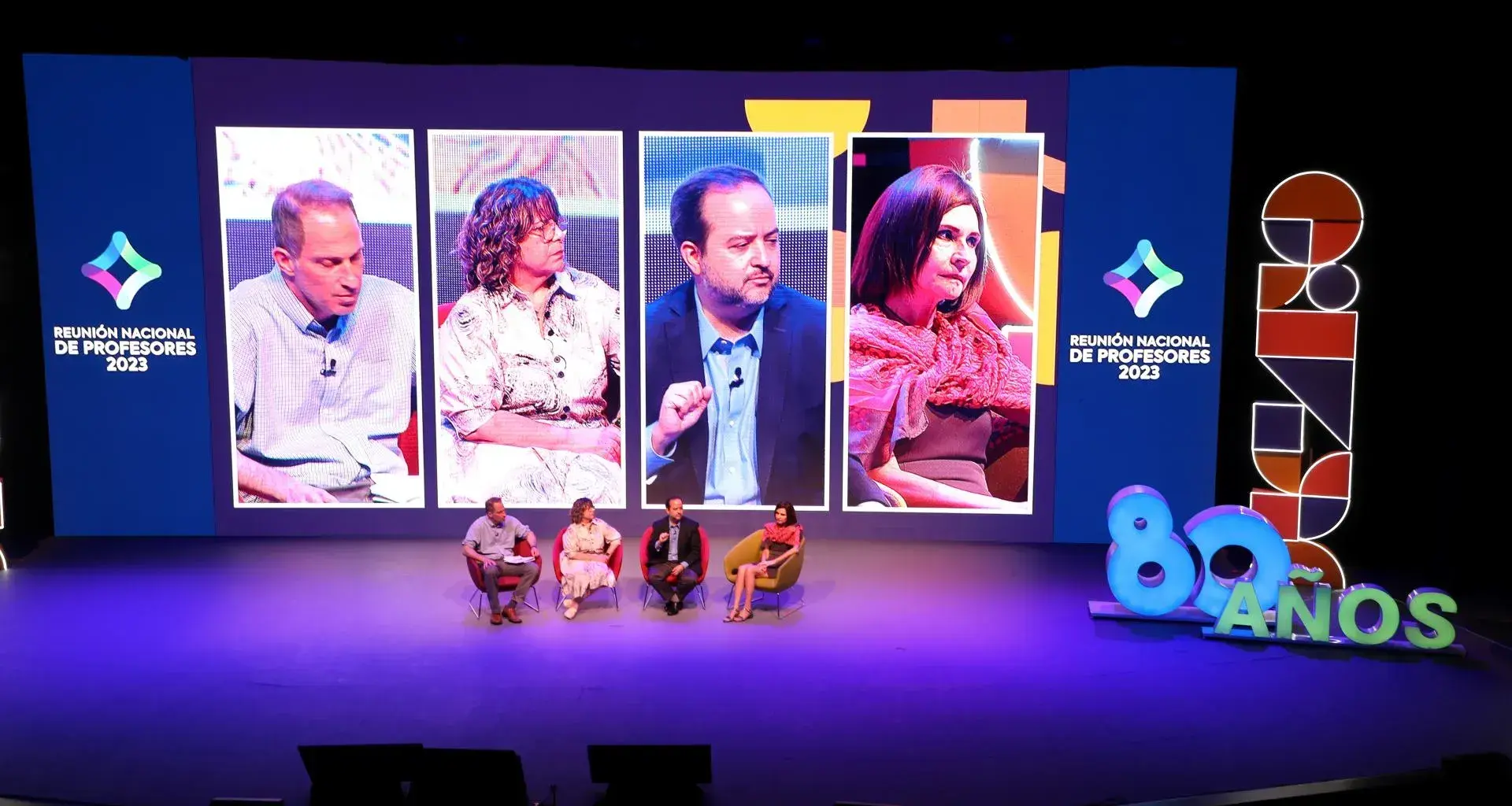As happens every year, staff and professors from all Tec de Monterrey campuses met (some in person and others remotely) this summer to analyze the direction the institution is headed in, update their knowledge, and get to know each other.
The 2023 National Teachers’ Meeting was held at the Monterrey campus from July 3 to 5.
This year’s meeting focused on creating meaningful connections with students, personal wellbeing and development, the connection between passion and purpose, along with the future of artificial intelligence.
Guest speakers included: Peter Felten, Executive Director of the Center for Engaged Learning; Zaida Muxí, Distinguished Professor of Architecture; Tony Silard, Distinguished Visiting Professor of Leadership; and futurist Anton Musgrave, to name but a few.
“To mark the Tec’s 80th anniversary... let’s continue to build a great faculty, a great Tecnológico de Monterrey, and make progress on the impact we’re going to have,” said Juan Pablo Murra, Rector for Higher Education at the Tec, during the opening.
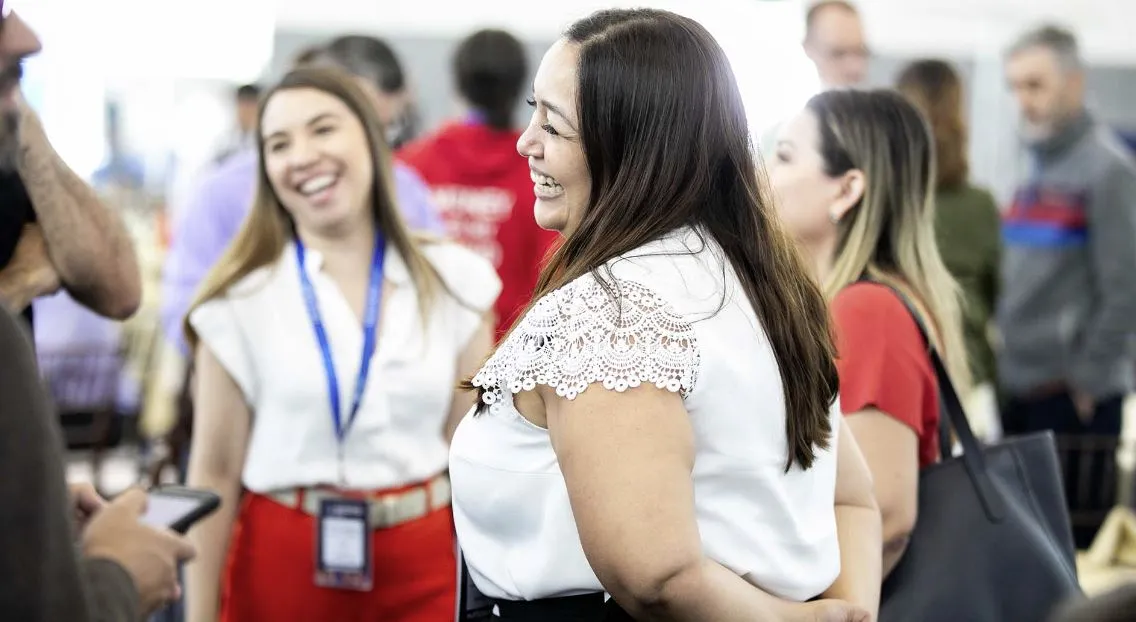
Teaching with passion and purpose
Anthony Silard, a Distinguished Visiting Professor of Leadership at the Tec and Director of the Center for Sustainable Leadership at the Luiss Business School in Rome, gave the keynote speech Teaching: The Link Between Passion and Purpose.
In his speech, he focused on the 5 P’s of success in finding the right career: passion, purpose, potential, pay, and people.
First, he explained that there are two types of passion: obsessive and harmonious. We can all have both forms of passion within us.
The one to work for is harmonious passion, which is based on enjoying an activity for its intrinsic value, without relying on external rewards or approval from others.
According to the speaker, “this passion is associated with more positive emotions, better performance, less anxiety, and less job burnout. It involves working in a more focused way in fewer hours.”
He then spoke about purpose and how it isn’t discovered overnight but cultivated over time.
While passion focuses on personal enjoyment and meeting internal needs, purpose focuses on how you can impact others and fulfill their needs. “My passion fuels me; my purpose fuels others.”
Purpose is related to the social mission of what you do, the impact you want to have on others.
And often, it is rooted in suffering. When someone experiences a painful event, they may choose to retaliate or channel their pain in order to make a positive difference in their own lives and the lives of others.
Potential refers to natural abilities and talents. “It’s important to identify what you’re really good at and excel at and to nurture that and perfect it.”
Pay is the financial part. It is the economic engine that allows us to support our family, cover our basic needs, and have financial stability.
Finally, people refers to collaboration and finding the right people to form a working team. “Feeling valued and appreciated in your work environment is an important driver in satisfying the human need to belong.”
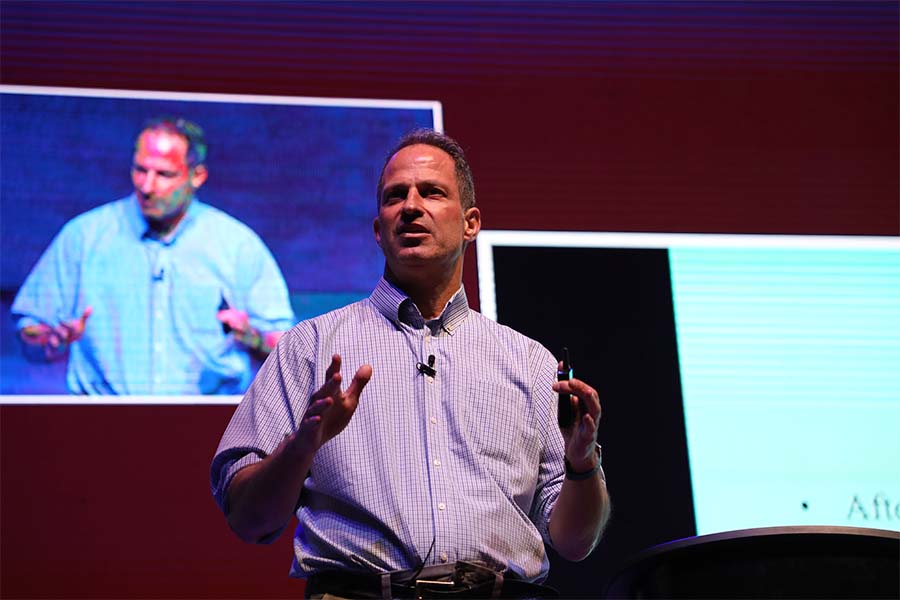
Meaningful connections in the classroom
What can teachers do to build valuable relationships with their students and with each other?
In considering this question, Peter Felten, Executive Director of the Center for Engaged Learning and Vice Rector for Teaching and Learning at Elon University, invited Tec professors to reflect on how they can create bonds with their students and contribute to their success.
“If students feel someone at their university knows them and cares about their success as people, not just as students, it gives them a sense of validation that comes from these human connections, and that’s very powerful.”
“Once students recognize that you care about them, where they come from, what their goals are, and what they’re trying to accomplish, you’ll have a solid foundation for teaching and learning.”
In his keynote speech, the speaker shared three strategies based on research he conducted in the United States, which is presented in “Relationship Rich Education” and “Connections are Everything,” books he co-authored:
1. Personalization
When students feel that the teacher cares enough to know their name, it makes them feel more valued, more motivated, and more comfortable asking for help.
2. Positive and negative feedback
The specialist recommended making a feedback “sandwich,” in other words, say something positive, then the critical things, and finish again with something positive.
He also suggested giving the feedback in four steps:
- Emphasize that the course and the institution have high standards and expectations for students.
- Believe in the student’s ability to meet those standards.
- Provide the student with specific guidance on how to improve.
- Make resources available to support student improvement.
3. Peer-to-peer feedback
The speaker pointed out that although it is not seen as a very useful way to give feedback, having students themselves do this can lead to mutual benefit, both for the giver and the receiver of the feedback.
By giving feedback, students practice how an essay should be reviewed and make an analysis of its strengths: “by asking our students for feedback on each other’s work, they’ll also benefit from carrying out that procedure.”
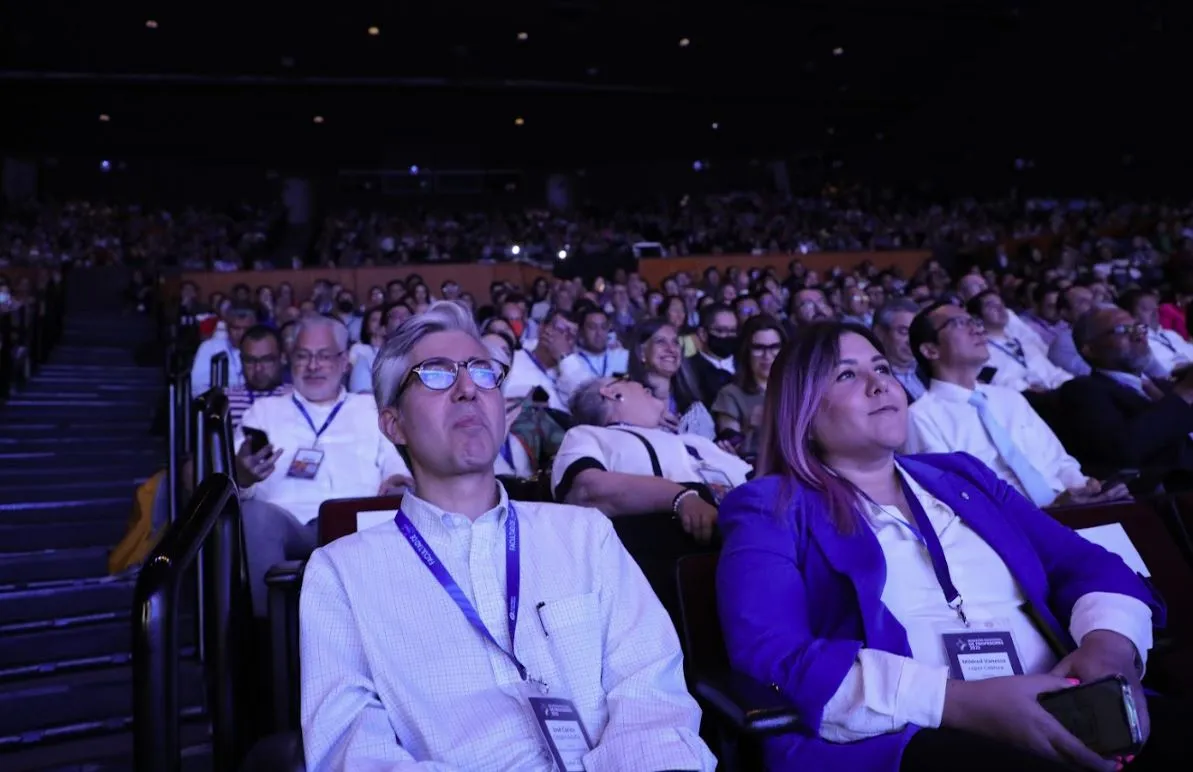
The era of Artificial Intelligence in the classroom
Futurist Anton Musgrave also gave a special speech on the exciting future of Artificial Intelligence.
“In the future, a lot of technology and artificial intelligence (AI) will replace human labor. It’s both frightening and exciting when we think about releasing human intelligence for other areas,” he said.
In that sense, he said, technology “will help us become better humans because it’ll give us more time to develop virtues such as empathy, collaboration, etc.”
Musgrave recommended that teachers in the process of incorporating more technological tools into their classes keep their sense of curiosity alive and avoid closing themselves off to learning from as many sources as possible.
“Talk to your students and your own children and ask them about how they interact with technology. Based on their answers, ask yourself how it can work in your classroom,” Musgrave explains.
“I think if you design the solution with students using their ideas, you’ll have a better chance of success because they’re the ones who really use technology on a day-to-day basis,” he added.
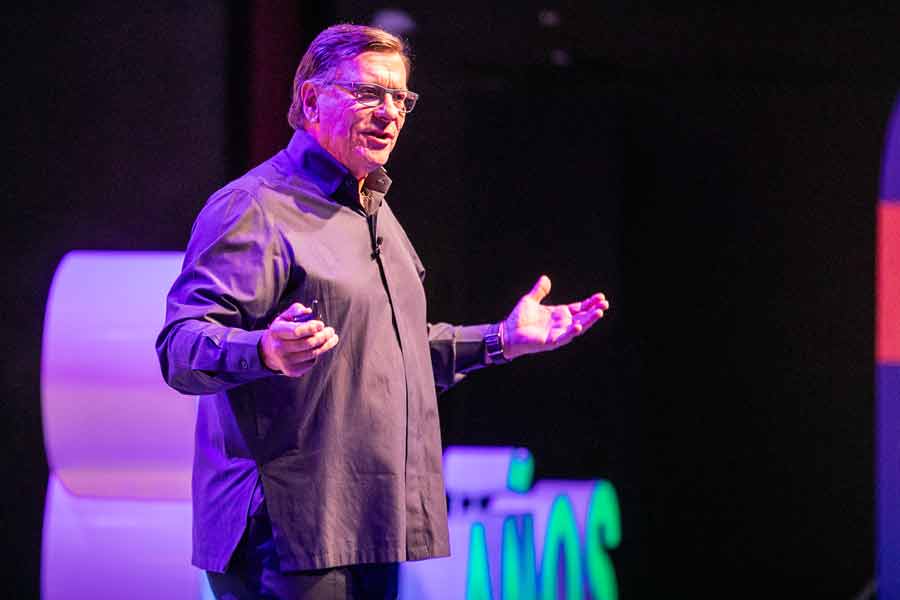
Cities with gender perspective
How can we build cities with gender perspective? In her speech, renowned architect and researcher Zaida Muxí reveals different ways women are made invisible in spaces and how to solve this.
Intersectionality is a fundamental tool for examining how different biological, social, and cultural categories determine the way each person experiences a city.
According to Muxí, the assignment of gender roles is observed in the available spaces in which reproductive and care work is almost exclusively women’s work in private spaces such as homes.
In her book “Mujeres, casas y ciudad. Más allá del umbral” (Women, Homes, and the City: Across the Threshold), Muxí said that care is shared, not individual, and women’s job opportunities will improve by valuing care work.
To achieve this, the doctor proposes the creation of women-friendly cities. This will achieve a spatial reorganization that makes it possible to break down hierarchies between people, while valuing the reproductive and care tasks performed by women.
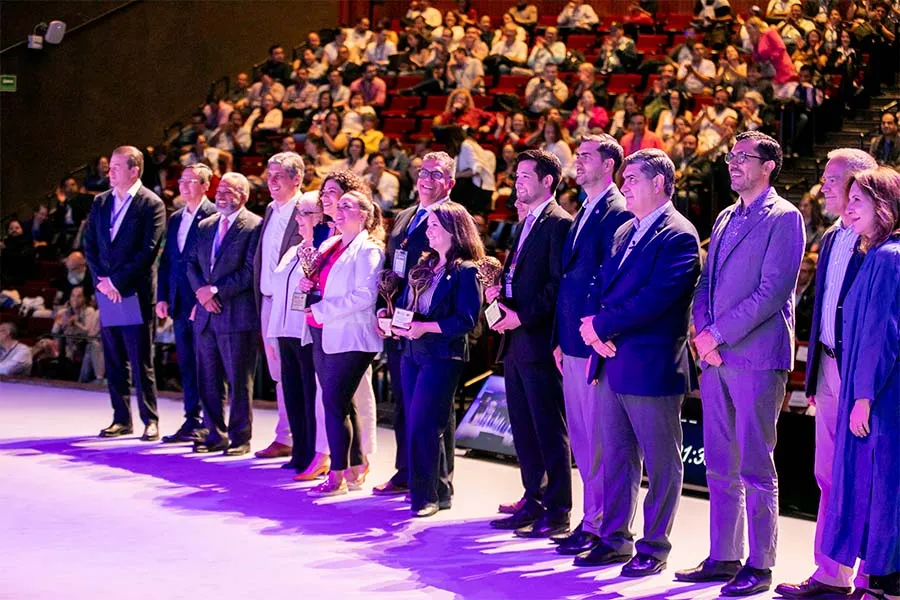
5 inspiring teachers
Eva María Guerra, Marilena Antunes, Jaime Mora, Ramiro Guzmán, and Luis Carlos Félix received the 2023 National Inspiring Professors Award.
This award, considered the highest institutional award for teaching, was given on this occasion to 5 professors: 3 full-time and 2 full professors.
“We congratulate the professors with very inspiring careers that we are recognizing. There is a constant in their stories that has to do with vocation and conviction for transforming lives,” remarked David Garza, the Tec’s Rector and Executive President.
Eva María Guerra, promoter of inclusion in business
The professor at EGADE Business School on Monterrey campus has published five academic papers on hospitality, internal marketing, and financial inclusion, two of which have been published in Q1 and Q2 international peer-reviewed journals.
She has published two chapters in the books: “The Role of Internal Marketing During the Covid-19 Crisis” and “La importancia de la educación continua en la ética y la cultura organizacional” (The Importance of Continuing Education in Organizational Ethics and Culture).
Luis Carlos Félix, vocation for research
As a professor at the School of Engineering and Sciences on North Sonora campus, he has published seven scientific articles in journals indexed by JCR and Scopus Conferences.
He was also a speaker and co-chair of the technical program at the International Symposium on Electromobility and the Scientific Technical Committee of the International Multi Conference on Systems, Signals, & Devices.
Marilena Antunes, promoter of engineering knowledge
The professor at the School of Engineering and Sciences has published 17 articles indexed in Scopus. She was a guest editor for Q1 journals and participated on the Latin American and Caribbean Consortium of Engineering Institutions review committee.
As a professor at the Monterrey campus, she was featured in activities such as the presentation of the project “Virtual Laboratory as a Strategy to Standardize Learning in National Biotechnology Courses,” at the International Conference on Educational Innovation.
Jaime Mora, expert professor in logistics
From the School of Engineering and Sciences, he has participated in the curricular design of graduate courses: “Simulation Models and their Applications” for the Master’s in Business Analytics and “Selected Topics” for the Master’s in Engineering Sciences.
The State of Mexico campus professor is also President of the Mexican Logistics Association and co-author and editor of the book “Humanitarian Logistics from the Disaster Risk Reduction Perspective.”
Ramiro Guzmán, leading business educator
The Mexico City campus business school professor is co-founder and COO of Shout Marketing Digital.
He was coordinator of the digital broadcasting of the Correo del Maestro publishing house’s campaign for the Ministry of Public Education’s National Textbook Selection Program for Secondary Schools. Guzmán also coordinated the broadcast of weekly webinars by Red Magisterial, which reached more than 500,000 basic education teachers.
About the 2023 National Teachers’ Meeting
The 2023 National Teachers’ Meeting is a space created for Tecnológico de Monterrey’s Undergraduate and Graduate academic community.
Its objective is to foster dialogue between colleagues, celebrate faculty impact, provide tools for faculty development, and initiate preparation for the next academic year.
During this tenth meeting, there will be institutional presentations, the Inspiring Professors Award ceremony, academic meetings, speeches, and social gatherings.
ALSO READ:

